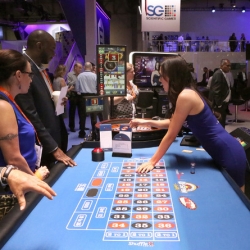
Scientific Games is easily overlooked, but the company’s gaming equipment and logos are seemingly ubiquitous in the US gaming market.
A Chicago court fined US lottery giant Scientific Games $315 million for what it considered a frivolous patent lawsuit. The court ruled that the lawsuit was designed to gain control of the automatic card-shuffler market.
In the original lawsuit, Scientific Games, one of the largest US gaming companies, sued Shuttle Tech International, Poydras-Talrick Holdings, and Aces Up Gaming over an automatic card-shuffler patent the three companies had collaborated on in 2012.
A jury ruled that the companies — plus an assignee named DigiDeal Corp — received $105 million in total damages from the suit. Under U.S. antitrust law, any damages are tripled. Thus the $105 million in damages were tripled to $315 million.
It means that Shuffle Tech will receive $135 million, Poydras-Talrick will receive $75 million, DigiDeal Corp will receive $60 million, and Aces Up will receive $45 million.
The decision brings to an end a 3-year antitrust lawsuit, though the litigation is likely to continue for some time to come.
Scientific Games to Appeal Ruling
Scientific Games said it would appeal the ruling. Susan Cartwright, a spokeswoman for Scientific Games, said of the ruling: “The company believes the jury reached the wrong result and will seek review of both the finding of liability and the damages award both before the trial court and if necessary on appeal.”
In 2012, the three gaming equipment companies agreed to collaborate on their own automatic card shuffler. Scientific Games filed a lawsuit that alleged the three companies used patented technology without authorization in the design of their product.
Antitrust Lawsuit against Scientific Games
In 2015, Shuffle Tech, Poydras-Talrick, and Aces Up filed an antitrust lawsuit claiming that Scientific Games’ patents were too broad, which rendered them invalid under US patent law. The 2015 lawsuit stated that Scientific Games misled the US Patent & Trademark Office about the nature of their product in order to gain the illegal patent.
That same suit claimed Scientific Games, which prints the Powerball and Mega Millions tickets in the United States, had engaged in “sham patent litigation against any competitor that dared to market competitive card shufflers.”
Lawyers for Scientific Games argued in court their patent submissions did not intend to mislead the US Patent Office, thus their 2012 lawsuit was not frivolous.
Scientific Games Profile
Scientific Games is a massive U.S. gaming group. The company was founded in Las Vegas as a manufacturer of instant lottery equipment in 1973 by John Koza and Daniel Bower. When Autotote Corporation bought Scientific Games Holdings Corp in 2000 and changed the merged company’s name to Scientific Games.
By 2002, roughly 50% of the $20 billion a year wagered on North American racing was tracked by Autotote. The company began supplying pari-mutuel wagering support worldwide in the same years that it was gaining such a large share in the US racebook market.
In 2006, Scientific Games bought The Global Draw, a brand of UK betting shops. In 2007, the company bought Games Media, which produced digital gaming solutions, and Barcrest, which designed betting and gambling terminals in the United Kingdom. That same year, the New York Times cited Italian lottery company GTECH and Scientific Games with transforming their industry from a mob-run business into a legitimate global market.
GTECH vs. Scientific Games
The NY Times story hinted at the emerging rivalry between Scientific Games and GTECH. Over the next several years, the two massive lottery giants went on a shopping spree, buying slot machine manufacturers and other gaming equipment companies.
In 2013, Scientific Games bought Williams Interactive, known for the WSM Gaming slot machines. In 2014, it bought Bally Technologies in a multi-billion dollar deal. In 2017, Scientific purchased NYX Gaming. Meanwhile, GTECH purchased International Game Technology (IGT) for $5 billion, then renamed itself IGT.
Scientific Games Holdings
These days, Scientific Games is one of the largest gaming companies in the world. Beyond the gaming machine companies it owns, Scientific Games owns 20% of Italy’s Lotterie Nazionali, 50% of China’s Guard Libang lottery, 49% of China’s CSG Lottery, and 20% of Northstar Lottery Group, which manages the Illinois State Lottery.
Scientific Games owns 20% of the UK betting site, Sportech, as well as 29.4% of the Robert Communications Network, a telecom company. Thus, Scientific Games is a massive global company with the resources to draw out the appeals process in the current case for years, while absorbing the costs of Chicago court’s ruling if those appeals fail.
